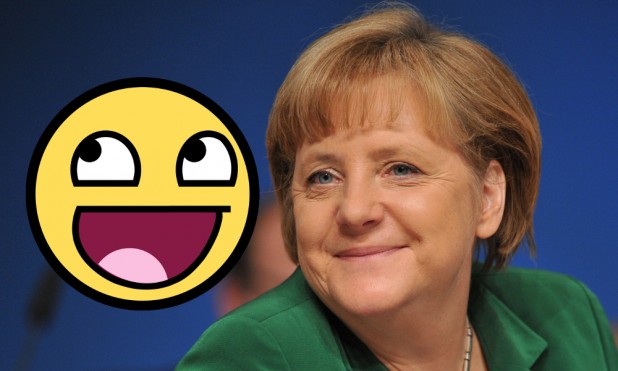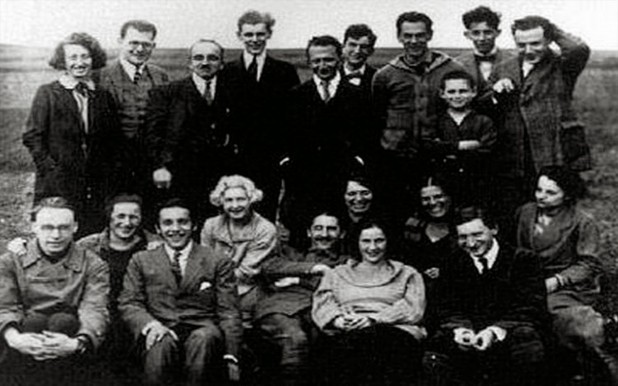Tom Sunic
Occidental Observer
September 28, 2015

Having lost, during and after World War II, over 9 million of its soldiers and civilians, Germany has had to wallow in expiation and self-abnegation. Its present grotesque multicultural policy of Willkomenskultur (“welcoming culture” toward non-European migrants), openly heralded by Chancellor Angela Merkel and her government, is the direct result of the lost war. Germany’s role of an exemplary host country for millions of non-European migrants has been a major linchpin of its legal system over the last 70 years — and by default for present day Central European countries subject today to floods of non-European migrants. The countries that were most loyal to National Socialist Germany in World War II, the contemporary Hungary, Croatia and to some extent Slovakia and Baltic countries further north, have similar self-denying dilemmas — due, on one hand, to their historically friendly pro-German ties, and on the other, due to the obligatory rituals of antifascist mea culpas, as demanded by Brussels and Washington bureaucrats. I have put together for TOO some excerpts from the chapter “Brainwashing the Germans” from my book Homo americanus: Child of the Postmodern Age, 2007 (foreword by Kevin MacDonald) (The second edition of this book is to be published by Washington Summit Publishers). I guess some of those lines below might shed some light into extremely serious political developments in Europe today.
* * *
In the aftermath of World War II, the role of Frankfurt School “scholars,” many of whom were of Jewish extraction, was decisive in shaping the new European cultural scene. Scores of American left-leaning psychoanalysts — under the auspices of the Truman government — swarmed over Germany in an attempt to rectify not just the German mind but also to change the brains of all Europeans. But there were also a considerable number of WASP Puritan-minded scholars and military men active in post-war Germany, such as Major Robert A. General McClure, the poet Archibald MacLeish, the political scientist Harold Laswell, the jurist Robert Jackson and the philosopher John Dewey, who had envisaged copying the American way of democracy into the European public scene.

As a result of Frankfurt School re-educational efforts in war-ravaged Germany, thousands of book titles from the fields of genetics and anthropology were removed from library shelves and thousands of museum artifacts were, if not destroyed by the preceding Allied fire-bombing, shipped to the USA and the Soviet Union. Particularly severe was the Allied treatment of German teachers and academics, wrote Caspar von Schrenck-Notzing, a prominent postwar conservative German scholar in his book on the post-WWII brainwashing of the German people. In his seminal book Schrenck-Notzing writes that the Western occupying authorities considered that the best approach in curing the defeated Germany was by treating Germans as a nation of “clinical patients” in need of a hefty dose of liberal and socialist therapy. Since National Socialist Germany had a significant support among German teachers and university professors, it was to be expected that the US re-educational authorities would start screening German intellectuals, writers, journalists and film makers first.
Having destroyed dozens of major libraries in Germany, with millions of volumes gone up in flames, the Allied occupying powers resorted to improvising measures in order to give some semblance of normalcy to what was later to become “democratic Germany.”
During the post-WWII vetting of well-known figures from the German world of literature and science, thousands of German intellectuals were obliged to fill out forms known in at the time as “Der Fragebogen” (The Questionnaire). In his satirical novel under the same name and translated into English as The Questionnaire, German novelist and a former conservative revolutionary militant, Ernst von Salomon, describes American “new pedagogues” extorting confessions from the German captives, who were subsequently either intellectually silenced or dispatched to the gallows. Schrenck-Notzing provides his readers with a glimpse of the mindset of the Allied educators showing the very great influence of the Frankfurt School:
Whoever wishes to combat fascism must start from the premises that the central breeding ground for the reactionary person is represented by his family. Given that the authoritarian society reproduces itself in the structure of the individual through his authoritarian family, it follows that political reaction will defend the authoritarian family as the basis for its state, its culture and its civilization. (my emphasis)
From Ethno-Nationalism to National-Masochism
Much later, Patrick J. Buchanan, in a similar vein, in his The Death of the West also notes that Frankfurt School intellectuals in postwar Germany, having been bankrolled by the American military authorities, succeeded in labeling National Socialist sympathizers as “mentally sick,” a term which would later have a lasting impact on political vocabulary and the future development of “political correctness” in Europe and America. Political prejudice, notably, a sense of authority and the resentment of Jews, were categorized as “mental illnesses” rooted in traditional European child-rearing. The ideology of antifascism became by the late twentieth century a form of “negative legitimacy” for Germany and the entire West. It implicitly suggested that if there was no “fascist threat,” the West could not exist in its present form.
Later on, German political elites went a step further. In order to show to their American sponsors their new democratic credentials and their philo-Semitic attitudes, in the early 1960’s they introduced legislation forbidding any historical revisionism of World War II and any critical study of mass immigration into Western Europe, including any study of negative socio-economic consequences of multiculturalism and multiracialism.
As of today the German Criminal Code appears in its substance more repressive than the former Soviet Criminal Code. Day after day Germany has to prove to the world that it can perform self-educational tasks better than its former American tutor. It must show signs of being the most servile disciple of the American hegemon, given that the “transformation of the German mind (was) the main home work of the military regime.”
In addition to standard German media vilification of local “trouble-makers” — i.e. “right -wingers” — Germany also requires from its civil servants obedience to constitutional commands and not necessarily their loyalty to the people or to the state of Germany. This is pursuant to Article 33, Paragraph 5, of its Basic Law. ]) The German legal scholar Josef Schüsselburner,Germany’s observes that the powerful agency designed for the supervision of the Constitution (the famed “Office for the Protection of the Constitution” [Verfassungsschutz]) is “basically an internal secret service with seventeen branch agencies (one on the level of the federation and sixteen others for each constituent federal state). In the last analysis, this boils down to saying that only the internal secret service is competent to declare a person an internal enemy of the state.“
Given that all signs of German nationalism, let alone White racialism, are reprimanded in Germany on the grounds of their real or purported unconstitutional and undemocratic character, the only patriotism allowed in Germany is “constitutional patriotism” — Germany is de jure a proposition nation: “The German people had to adapt itself to the Constitution, instead of adapting the Constitution to the German people,” writes the German legal scholar, Günther Maschke. German constitutionalism, continues Schüsselburner, has become “a civil religion,” whereby “multiculturalism has replaced the Germans by the citizens who do not regard Germany as their homeland, but as an imaginary “Basic Law country.” As a result of this new civil religion, Germany, along with other European countries, has now evolved into a “secular theocracy.”
Similar to Communism, historical truth in Western Europe is not established by an open academic debate but by state legislation. In addition, German scientists whose expertise is the study of genetically induced social behavior, or who lay emphasis on the role of IQ in human achievement or behavior, and who downplay the importance of education or environment — are branded as “racists.“
When Muslim Arabs or Islamists residing in Germany and elsewhere in Europe are involved in violent street riots, the German authorities do tolerate to some extent name calling and the sporadic usage of some anti-Arab or anti-Turkish jokes by local autochthonous (native) Germans. Moreover, a Muslim resident living in Germany can also legally and temporarily get away with some minor anti-Semitic or anti-Israeli remark—which a White German Gentile cannot dream of. By contrast, a non-Jewish German average citizen, let alone a scholar, cannot even dream about making a joke about Jews or Muslims—for fear of being labeled by dreaded words of “anti-Semitism” or “racism.”
Tom Sunic is author (www.tomsunic.com)
 Daily Stormer The Most Censored Publication in History
Daily Stormer The Most Censored Publication in History


